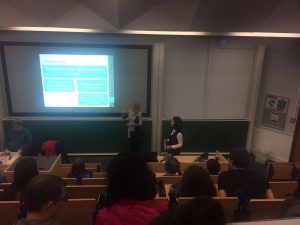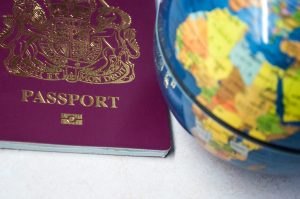Migrants and Refugees in Europe: Public Lecture
In December, the University of Southampton and a local refugee charity, Southampton and Winchester Visitors Group (SWVG) held a public lecture on Migrants and Refugees in Europe. Dr Ingi Iusmen, a Politics and International Relations lecturer, reports back on what was discussed.
The three speakers – Professor David Owen from Politics and International Relations, Dr Scot Soo of Modern Languages and Dr Hedvig Schmidt from the Law School – explored aspects related to the main theme from interdisciplinary perspectives.
Professor Owen drew on political analysis to investigate what makes a refugee crisis, by paying close attention to the current refugee crisis. Dr Schmidt discussed, from a legal perspective, the extent to which EU law protects third country nationals (TCNs) and Dr Soo, from a historical standpoint, presented how the Spanish refugees were treated by the French government in late 1930s.
Despite the specific focus of each presentation, all presentations shared some common themes that are so topical when dealing with refugees/asylum-seekers and non-EU migrants. These underlying themes include the legal loopholes of the European and international legal instruments, the importance of national interest and preferences when faced with a refugee influx, the conundrums surrounding the responsibility and/or duty to protect refugees and the interpretation of human rights norms in practice.
Professor Owen’s presentation What makes a refugee crisis? focused on the current refugee crisis in Europe and examined both the sources (production) of a crisis and the national/European responses to it. The crisis of responses (vis-a-vis the refugee crisis) is particularly important because it ascertains a failure on the part of the international community to respond in a way that respects the duty to protect the human rights of refugees.
The current refugee crisis also presents European states with a practical dilemma: namely the current ‘refugee regime gives rise to a situation in which states, collectively, have an interest in effective and fair refugee protection, but states, individually – and other things being equal, have an interest in minimising the burden’ (David Owen).
Additionally, the EU Member States’ duty of cooperation regarding refugee admission is further complicated by the EU’s own legal structures – such as the Dublin Convention and the Schengen area – that rendered cross-national efforts to deal with and control the refugee flow much more difficult.
In her presentation The Free Movement Rights for Migrants and Refugees under EU Law, Dr Schmidt talked about the issues that refugees and migrants face in the EU as TCNs under the free movement rules. The gist of this presentation was that TCNs do not hold any rights of their own: they only gain rights by being a dependent of or a carer for an EU citizen. Most importantly, the rights of TCNs (e.g. the rights to work or reside in any EU state) are only triggered via the movement of the EU citizen that they are dependent on.
Yet, the flipside of this is that the TCN is at risk of losing these rights if the relationship with the EU citizen breaks down or the EU citizen is no longer dependent upon the TCN. By drawing on some recent rulings of the European Court of Justice, Dr Schmidt’s presentation clearly illustrated that EU law protects TCNs only if they are associated to an EU national: whenever this association comes to an end, then the protection of TCNs’ rights ceases as well.
Dr Soo’s presentation Refugee Camps and their Legacy: France and the Spanish Civil War Exiles, explored the plight of half a million Spanish refugees who sought refuge in France in early 1939. The French government’s poor treatment of these refugees, and the appalling conditions they had to endure in camps, showed that when faced with critical situations involving refugees, national governments (such as the French in this instance) prefer to prioritise national security over the welfare of refugees.
By employing evidence from historical documents, Dr Soo showed how the French state’s reception policy affected refugees both at the time and over the duration of the refugees’ lives. In other words, there is an intimate connection between the conditions under which refugees are received and their subsequent integration into the mainstream society.

The chair of SWVG, Anne Leeming, briefly presented how the charity supports, in concrete terms, refugees and asylum-seekers in Southampton and Winchester. From helping them access public services such as healthcare, to finding accommodation and lodging an asylum claim, the SWVG plays a significant role at community level, in helping vulnerable communities like refugees.
The insights provided into the SWVG’s work by Mrs Leeming showed that there are both legal and practical challenges that refugees have to grapple with, and therefore, the local community’s support and involvement is paramount.
What this public engagement event succeeded in highlighting, amongst others, was that both theoretically (eg legally, policy wise) and practically (eg helping refugees concretely) refugees face massive challenges in the UK and across Europe. Moreover, these challenges become persistent and difficult to overcome due to the politicians’ reluctance to address the current legal and policy loopholes in the international refugee regime.
To this end, the involvement, no matter how small, of society members in supporting charities – such as SWVG – who work with refugees, becomes even more crucial.
Dr Ingi Iusmen is Lecturer in Governance and Policy within Social Sciences: Politics & International Relations at the University of Southampton.

You can find out more about the work of SWVG here.


Leave a Reply
You must be logged in to post a comment.